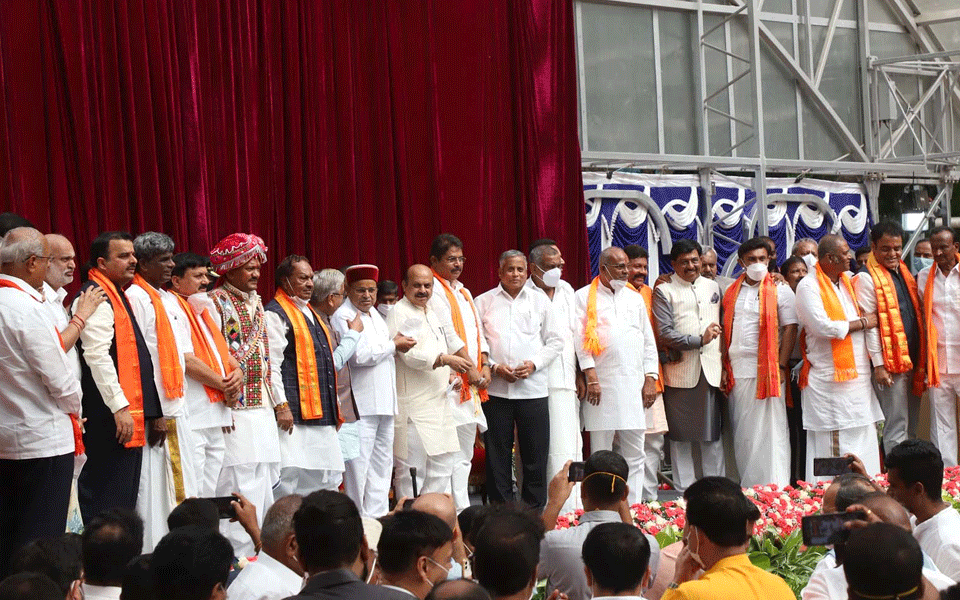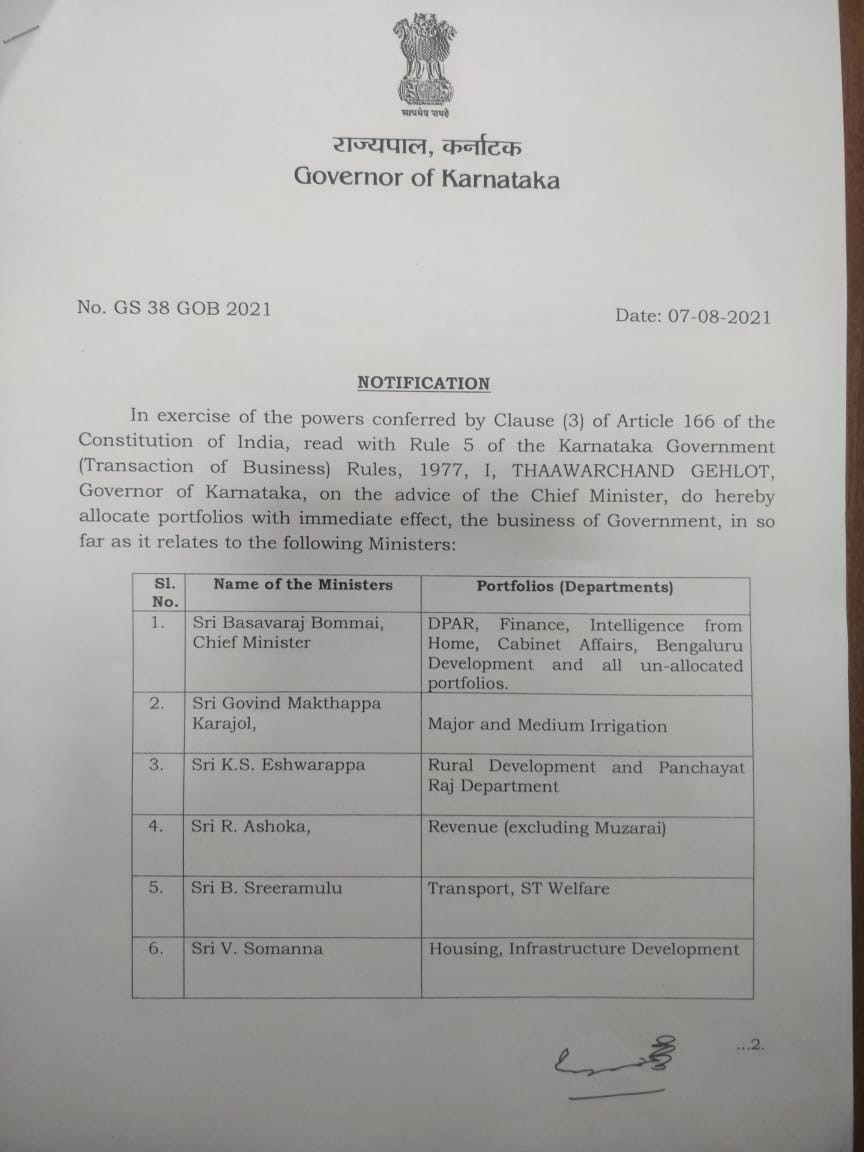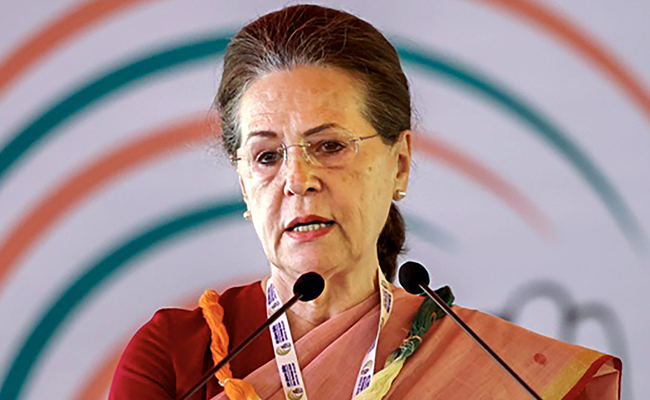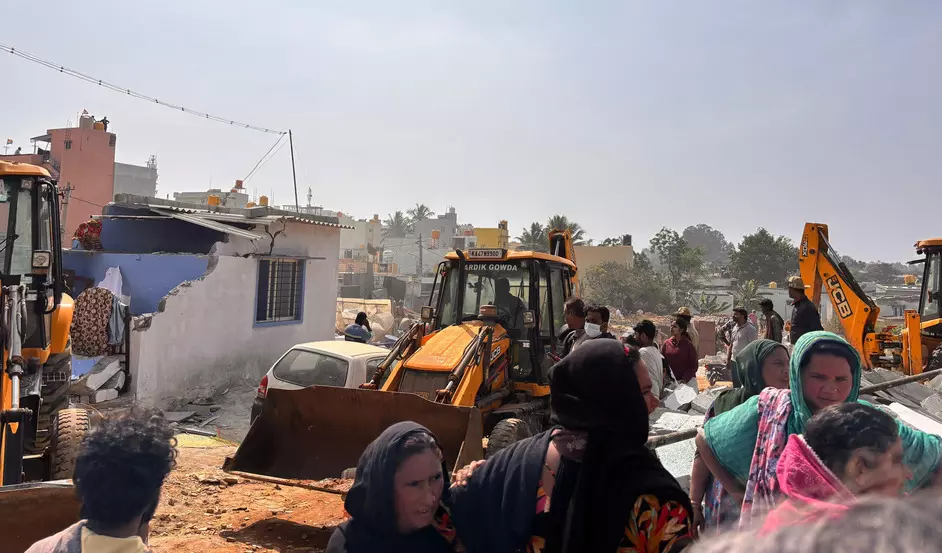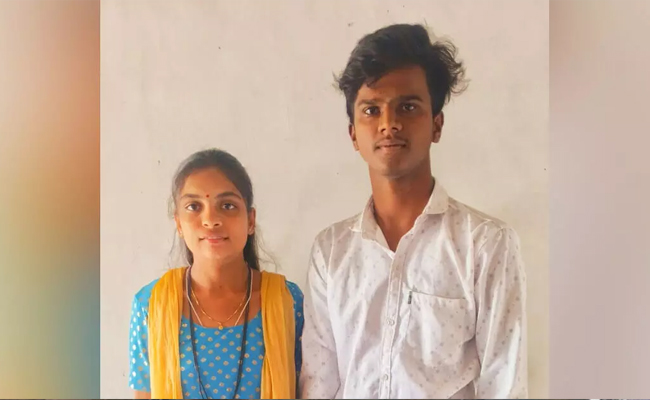Bengaluru: In the wake of the completion of the Cabinet expansion for the newly appointed chief minister Basavaraj Bommai, the cabinet of ministers have now been allotted with respective department in their tenure.
Ministers and their Allotted Departments
1 Chief Minister Basavaraj Bommai – DPAR, Finance, Intelligence from Home, Cabinet Affairs, Bengaluru Development, and all un-allocated portfolios
2 Govind Makthappa Karajol – Department of Major and Medium Irrigation
3 K.S. Eswarappa – Department of Rural Development and Panchayat Raj
4 R. Ashoka – Department of Revenue (Excluding Muzarai)
5 Sreeramulu – Departments of Transport and ST Welfare
6 V. Somanna – Department of Housing, Infrastructure Development
7 Umesh Katti – Departments of Forest, Food, Civil Supplies, and Consumer Affairs
8 Angara. S – Department of Fisheries, Ports and Inland Transport
9 J. C. Madhu Swamy – Departments of Minor Irrigation, Law, Parliamentary Affairs and Legislation
10 Araga Jnanendra – Home Department (Excluding intelligence)
11 Dr. Ashwath Narayan – Departments of Higher Education. IT & BT, Science, and Technology, Skill Development.
12 Chandrakantagouda Channappagouda Patil – Department of Public Works
13 Anand Singh – Departments of Ecology and Environment, Tourism
14 Kota Shrinivas Poojari – Departments of Social Welfare, Backward Classes Welfare
15 Prabhu Chauhan – Department of Animal Husbandry
16 Murugesh Nirani – Department of Large and Medium Industries
17 Arabail Hebbar – Department of Labour
18 S. T. Somashekhar – Department of cooperation
19 B. C. Nagesh – Department of Primary and Secondary Education
20 Basavaraj Byrati – Department of Urban Development ( Including KUWSDB & KUIDFC)
21 Dr. Sudhakar – Department of Health and Family Welfare
22 K Gopalaiah- Department of Excise from Finance
23 Jolle Shasikala Annasaheb – Department of Muzarai, Haj & Wakf
24 N Nagaraju (MTB) - Departments of Municipal Administration, Small Scale Industries, Public Sector Industries
25 Narayanagowda - Departments of Sericulture, Youth Empowerment, and Sports
26 BV Nagesh - Primary and secondary education and Sakala
27 Sunil Kumar – Departments of Energy, Kannada, and Culture
28 Achar Halappa Basappa – Departments of Mines & Geology in Commerce and Industries. Women & Child Development and Disabled & Senior Citizen Empowerment
29 B. C. Patil – Department of Agriculture
30 Munirathna – Departments of Horticulture & Planning, Programme Monitoring, and Statistics.
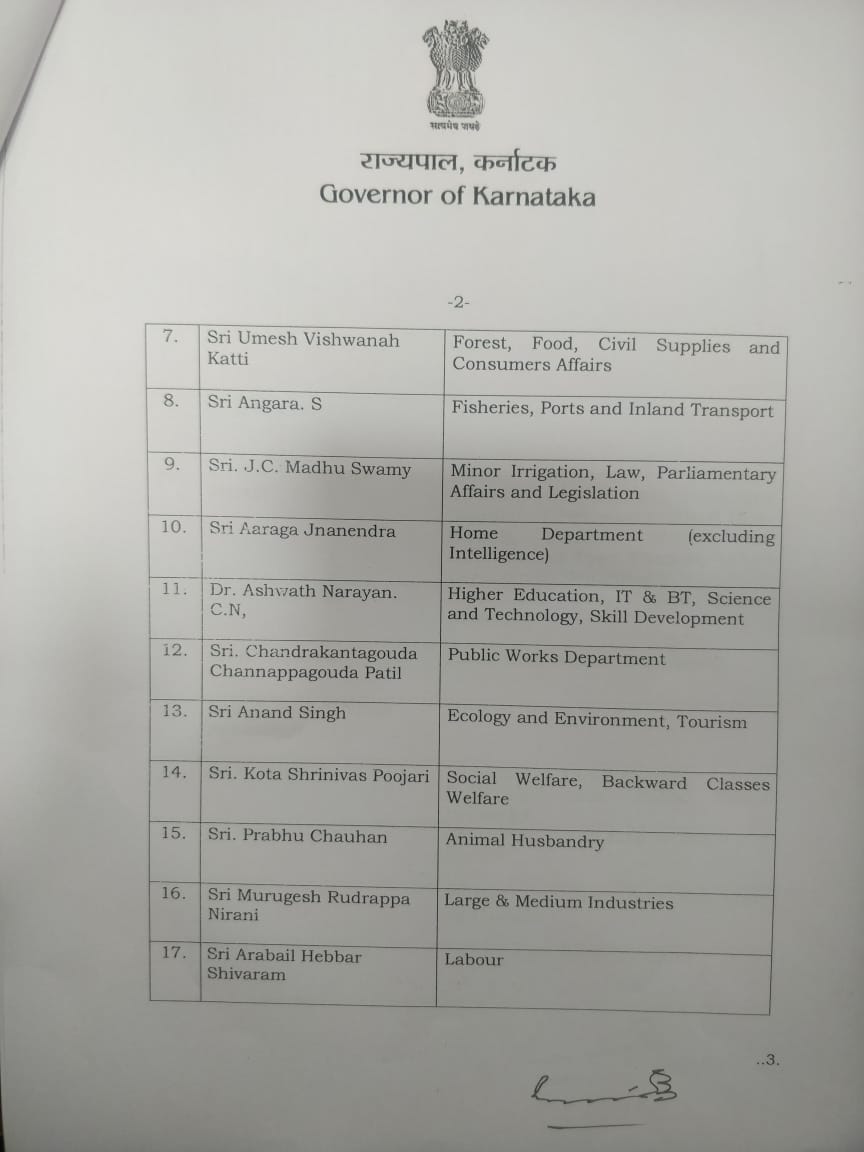


Let the Truth be known. If you read VB and like VB, please be a VB Supporter and Help us deliver the Truth to one and all.
New Delhi, Dec 22 (PTI): Congress Parliamentary Party chairperson Sonia Gandhi on Monday said the "demolition" of the historic Mahatma Gandhi National Rural Employment Guarantee Act (MGNREGA) will have catastrophic consequences for crores of people across rural India and called upon all to unite and safeguard the rights that protect everyone.
In an editorial in 'The Hindu' titled "The bulldozed demolition of MGNREGA", the former Congress chief said the "death" of MGNREGA is a collective failure.
This comes a day after President Droupadi Murmu gave her assent to the Viksit Bharat Guarantee for Rozgar and Ajeevika Mission (Gramin) (VB-G RAM G) Bill, which replaces the MGNREGA and has a provision for 125 days of wage employment for rural workers.
ALSO READ: Delhi polluted owing to Aravalli, says anchor Rajat Sharma; netizens troll him
"MGNREGA realised the Mahatma's vision of Sarvodaya (welfare of all) and enacted the constitutional right to work," Gandhi said.
"It is imperative, now more than ever, to unite and safeguard the rights that protect us all," she added.
Gandhi said the employment guarantee scheme to deal with rural distress has now been "bulldozed and demolished".
MGNREGA was a rights-based legislation inspired by Article 41 of the Constitution of India, which calls upon the government to secure citizens' right to work, she said.
"Over the past few days, the Narendra Modi government worked to bulldoze MGNREGA's abolition without any discussion, consultation, or respect for parliamentary processes or Centre-State relations. The removal of the Mahatma's name was only the tip of the iceberg. The very structure of MGNREGA, so integral to its impact, has been annihilated," she said.
She described VB-G RAM G as "nothing but a set of bureaucratic provisions".
ALSO READ: Hindu outfit urges Karnataka governor to withhold assent to anti-hate speech bill
The Modi government's new Bill has restricted the ambit of the scheme to rural areas as notified by the Union at its discretion, Gandhi said.
Against uncapped central allocation, there is now a pre-determined budgetary allocation that caps the number of days of employment provided in each state. The number of workdays provided are, therefore, left to the Centre's priorities rather than the people's needs, she said, adding that the all-year guarantee of employment has been finished off.
Gandhi said one of the greatest impacts of MGNREGA was increased bargaining power of the landless poor in rural India, which elevated agricultural wages.
"This bargaining power will definitely be eroded under the new law. The Modi government is attempting to suppress wage growth and that too at a time when the proportion of employment in agriculture has risen for the first time since Independence, contrary to what should have been the case," she noted.
She also said by transferring a significant portion of the expense onto the states, the Modi government is discouraging them from providing work under the scheme. The finances of states, already under severe stress and strain, will be further devastated, the Congress leader said.
Under the VB-G RAM G Bill, the cost-sharing pattern is 60:40 between the Centre and states, 90:10 for northeastern and Himalayan states, and 100 per cent central funding for Union territories without legislatures.
Gandhi further said that aside from demolishing the demand-based nature of the programme, the Modi government has ended the decentralised nature of the scheme.
"The Modi government is resorting to fraudulent claims that it has enhanced the employment guarantee from 100 days (under MGNREGA) to 125 days. For all the reasons outlined above, that will certainly not be the case. Indeed, the real nature of the Modi government's intentions can be understood from its decade-long track record of throttling MGNREGA.
"It began with the Prime Minister's (in)famous mocking of the scheme on the floor of the House and proceeded apace through a 'death by a thousand cuts' strategy through, for instance, stagnant budgets, the use of disenfranchising technology and delayed payments to workers," she said in the article.
Gandhi said the demolition of the right to work must not be seen in isolation but as part of the long assault by the ruling establishment on the Constitution and its right-based vision for the country.
"The most fundamental right to vote is under unprecedented assault. The Right to Information has been desecrated with legislative changes that weaken the autonomy of Information Commissioners, and by wholesale exemptions from the Act for ill-defined 'personal information data," she said.
The Right to Education has been undermined and The Forest Rights Act, 2006, was markedly weakened by the Forest (Conservation) Rules (2022), which removed the gram sabha from any role in permitting the diversion of forest land, the Congress leader said, adding that The Right to Fair Compensation and Transparency in Land Acquisition, Rehabilitation and Resettlement Act, 2013 has been significantly diluted.
"Through the three black farm laws, the government attempted to deny farmers the right to a minimum support price. The National Food Security Act, 2013, may very well be next on the chopping block," Gandhi said.

